The State of the Baltic Sea 2023
Researchers from GEOMAR contribute to key report of the Baltic Marine Environment Protection Commission HELCOM launched today
Eutrophication and pollution, deoxygenation, overfishing, habitat destruction and land use continue to put the Baltic Sea under increasing stress, according to the “State of the Baltic Sea 2023” report launched today by the Baltic Marine Environment Protection Commission (HELCOM). Little to no improvement of environment occurred during the assessment period 2016 to 2021, the report finds.
“One key focus of the report is on biodiversity on the Baltic Sea. Many species face multiple stressors from climate change and other human impacts. Only a combination of measures can help to improve their habitats and protect the unique biodiversity of this region that many people depend on”, explains Dr. Jan Dierking, marine ecologist at GEOMAR Helmholtz Centre for Ocean Research Kiel. “One such approach would be to better coordinate scientific research in the region and harness the benefits of model simulations,” adds Dr. Marco Scotti, ecosystem modeler at GEOMAR. The two researchers are members of the HELCOM Expert Group on Foodwebs and contributed to the new report.
In their research, Dr. Dierking and Dr. Scotti strive to enhance the understanding of Baltic Sea food webs. Their work on trophic ecology help to identify key species that play crucial roles for ecosystem health and functioning and mediate the spread of direct and indirect effects in food webs. A particular focus lies on the development in species communities and food webs under changing climatic and environmental situations as well as benefits of ecosystem-based fisheries management.
Information that has fed directly into the report includes a meta-analysis of Baltic Sea studies in the field of stable isotope ecology that was recently published by an author team around Dr. Dierking in the journal Ambio. This subfield of ecology has advanced scientific knowledge of the feeding and migration behaviour of organisms, nutrient and pollutant flows, the functioning of the carbon cycle, as well as food web structure and dynamics. The meta-analysis summarized the resulting advances regarding the Baltic ecosystems. It also highlighted that a stronger focus on collaboration around the Baltic and data integration, including the implementation of a macro-regional ‘Baltic Isobank’ as central repository for Baltic stable isotope datasets, could further improve scientific understanding and address societal challenges, the author team argued.
Working closely together with the German Federal Agency for Nature Conservation (Bundesamt für Naturschutz, BfN, Germany), GEOMAR experts were also able to demonstrate that ecosystem-based fisheries management would restore stocks of commercially relevant fish species and contribute to protect the threatened harbour porpoise population. Using model simulations, the researchers tested five scenarios from no fishing to ecosystem-based fisheries management. This approach accounts for the roles of species within their ecosystem and adjusts catches accordingly to keep fish stocks in a healthy, productive and resilient condition. The ecosystem models enable calculating food web indicators that quantify the Good Environmental Status and deviations from it, as requested by the European Marine Strategy Framework Directive (MSFD). These indicators are of strategic importance as they allow detecting early signs of stress prior the onset of most extreme consequences such as regime shifts.
Building on such findings, the “State of the Baltic Sea 2023“ report calls for ecosystem approaches in marine governance throughout the implementation of the HELCOM Baltic Sea Action Plan.
“Successful environmental management and protection of the Baltic Sea relies on the scientific understanding of the state of our environment. GEOMAR has a long-standing and broad expertise from a variety of marine research disciplines”, says GEOMAR Director Professor Dr. Katja Matthes. “Our involvement in the work of HELCOM and the State of the Baltic Sea 2023 report are a great example of how we contribute to policy-relevant assessments to enable the development of sustainable solutions for pressing societal issues.”
Key highlights from the “State of the Baltic Sea 2023” report:
- Environmental deterioration: Despite efforts to improve the Baltic Sea environment, the assessment period (2016-2021) showed little to no improvement. Several indicators, including pelagic and benthic habitats, fish stocks, waterbirds, and marine mammals, did not meet their threshold values, with some showing a worsening trend.
- Impact of human activities: Pressures on the Baltic Sea ecosystem include eutrophication, pollution from hazardous substances, overfishing, and habitat destruction. These pressures are adversely affecting the ecosystem, leading to a decline in the overall state of biodiversity.
- Cost of inaction: The poor environmental status of the Baltic Sea clearly impacts a wide range of ecosystem services on which we depend, affecting the profitability of fisheries and tourism for example. Achieving good environmental status in national marine waters by 2040 has been estimated to be worth 5.6 billion euros per year to the people around the Baltic Sea.
- Regional measures: The assessment reveals that when regional measures are implemented, they have a positive impact on the environment. Reductions in nutrient inputs and hazardous substances, as well as actions for biodiversity conservation, have shown signs of success in some parts of the Baltic Sea.
- Climate change: Climate change is increasingly affecting the Baltic Sea region, leading to rising water temperatures, reduced ice cover, and more extreme weather events. This amplifies the need for measures to enhance ecosystem resilience and mitigate the negative impacts of climate change.
- Ecosystem-based management: The assessment emphasizes the importance of ecosystem-based management and transformative changes across various socioeconomic sectors interacting with or affecting the Baltic Sea environment.
Original publications:
HELCOM (2023): State of the Baltic Sea. Third HELCOM holistic assessment 2016-2021. Baltic Sea Environment Proceedings n°194, https://stateofthebalticsea.helcom.fi
Eglite, E., Mohm, C. & Dierking, J. (2023): Stable isotope analysis in food web research: Systematic review and a vision for the future for the Baltic Sea macro-region. Ambio, doi: https://doi.org/10.1007/s13280-022-01785-1
Scotti M., Opitz S., MacNeil L., Kreutle A., Pusch C. and Froese R. (2022): Ecosystem-based fisheries management increases catch and carbon sequestration through recovery of exploited stocks: The western Baltic Sea case study. Frontiers in Marine Science 9, 879998. https://doi.org/10.3389/fmars.2022.879998
Background: HELCOM
The Baltic Marine Environment Protection Commission – also known as the Helsinki Commission (HELCOM) – is an intergovernmental organisation (IGO) and a regional sea convention (the Helsinki Convention) in the Baltic Sea area. A regional platform for environmental policy making, HELCOM was established in 1974 to protect the marine environment of the Baltic Sea from all sources of pollution. The Helsinki Convention has ten Contracting Parties which are also the members of HELCOM. These include all Baltic Sea states and the European Union. The headquarters of HELCOM, the Secretariat, is in Helsinki.
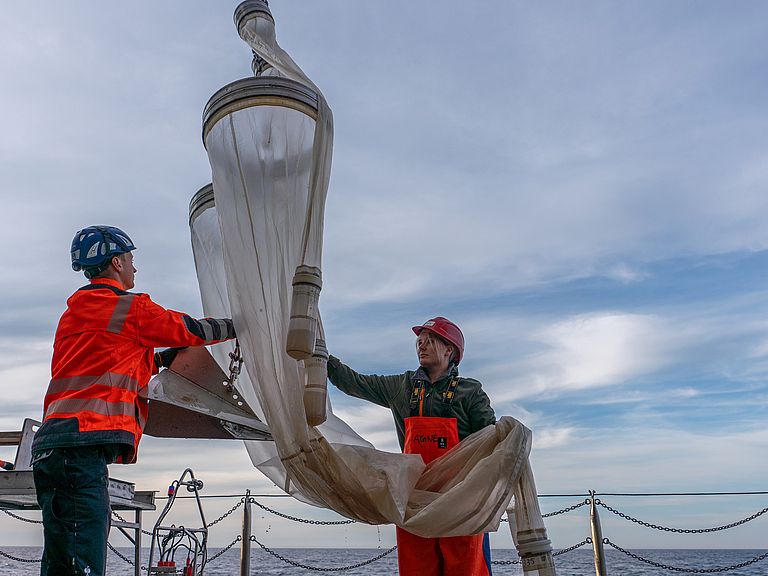
Deployment of a multi plankton net on board the ALKOR in the Baltic Sea. Photo: Sarah Kaehlert, GEOMAR
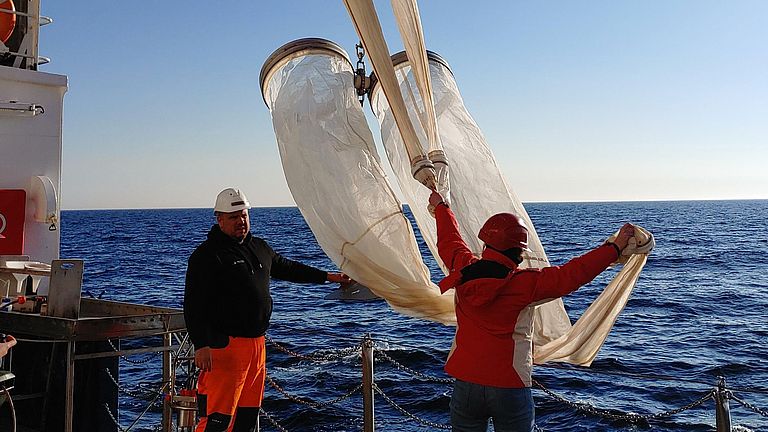
Researchers on board ALKOR use the multi-net to collect plankton samples from different water depths. Photo: Jan Dierking, GEOMAR
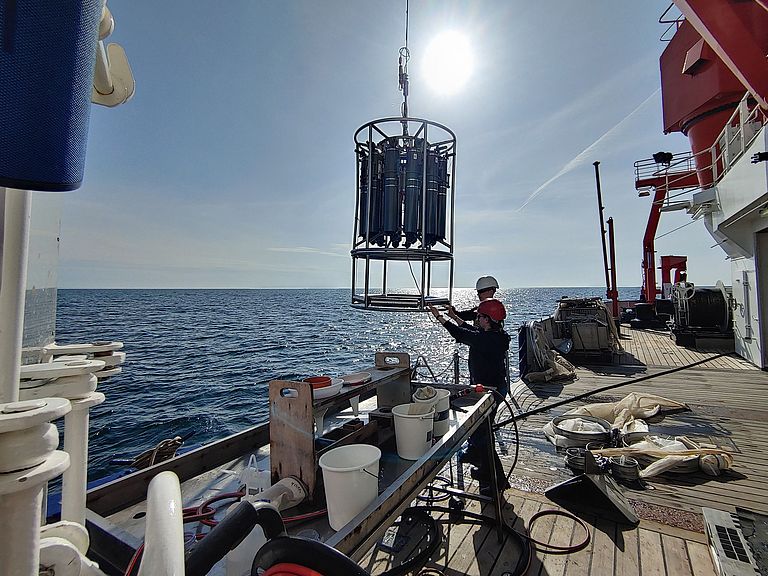
A rosette water sampler is deployed in the Baltic Sea from aboard the research vessel ALKOR. Photo: Jan Dierking, GEOMAR
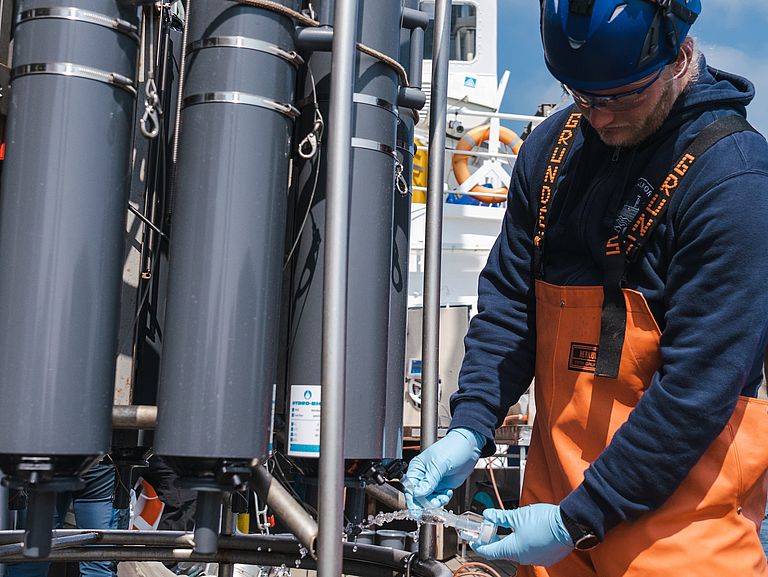
Taking water samples from the rosette water sampler on board the research vessel ALKOR in the Baltic Sea. Photo: Sarah Kaehlert, GEOMAR
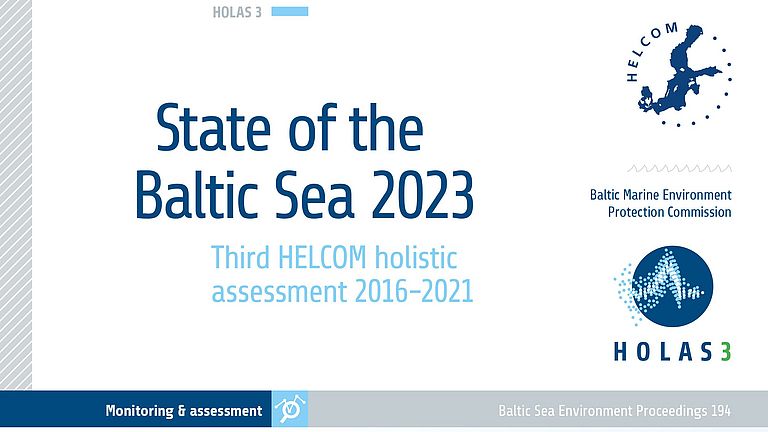
Cover of the HELCOM report "State of the Baltic Sea 2023" (Detail).


